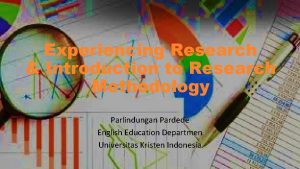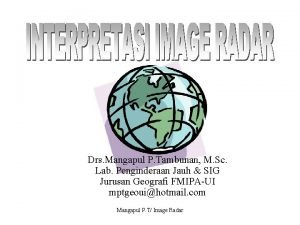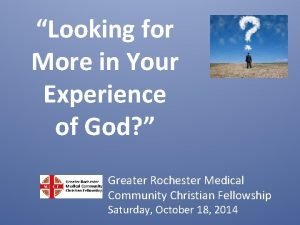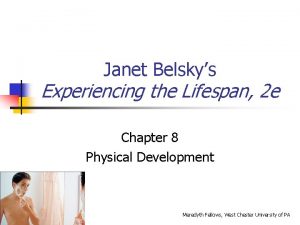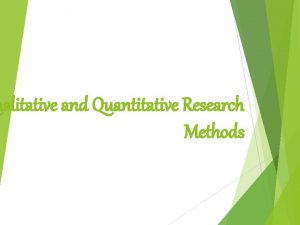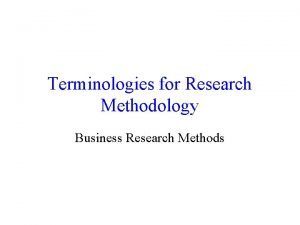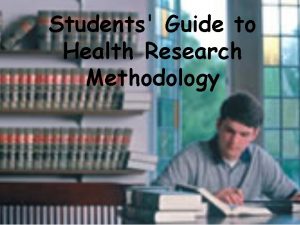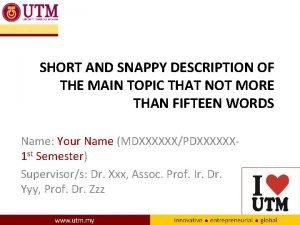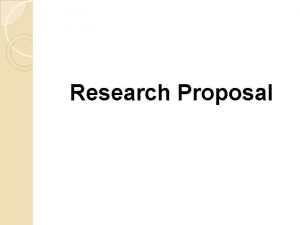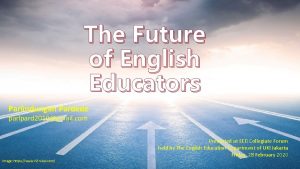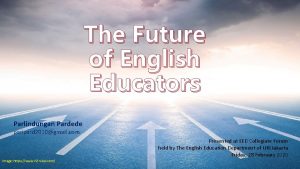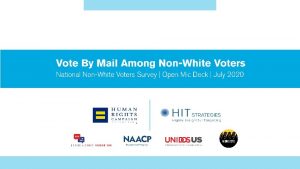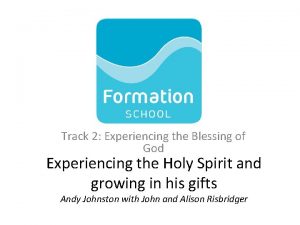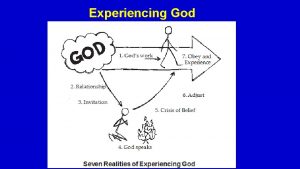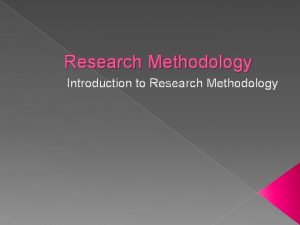Experiencing Research Introduction to Research Methodology Parlindungan Pardede













- Slides: 13

Experiencing Research & Introduction to Research Methodology Parlindungan Pardede English Education Departmen Universitas Kristen Indonesia

Vision Mission Becoming a leading English Education Department through the three missions of higher education based on Pancasila, Christian values, and the application of information and communication technology in Jabodetabek in 2025. 1. Organizing creative English learning by applying information and communication technology. 2. Increasing the quantity and quality of research and publication in the field of English Education in both the national and international levels 3. Organizing quality scientific activities in the field English Education at the national and international levels. 4. Continuously increasing the quantity and quality of community service in the field of English Education. 5. Increasing networking with related national and international institutions in the three missions of higher education.

Constructive learning Model • Learning is an active, constructive process. • Learner is an information constructor. • New knowledge is formed by having new experience to get new information which is linked to prior knowledge Experience Testing/Applying in New situations Observation & Reflection Forming Abstract Concepts

Nazara’s (2019) The Effect of Using Short Stories on Secondary School Students’ Critical Reading 1. Purpose /objective: to investigate the effect of short stories in developing EFL students’ critical reading skills (at the end of Introduction [p. 21] and at the end of Lit. review [p. 23]) 2. Previous studies’ results: the information is presented in “Literature Review” section (pp. 21— 23)] 3. Research question: Not stated, but implied through the ‘objective’. 4. Data collected: test result scores (p. 24) 5. Instrument: tests of critical reading (p. 24) 6. The collected data is presented in Findings section (pp. 24— 25) 7. the data collected manage to answer the research question, i. e. short stories positively affected the critical reading skills of the students in the experimental group (p. 26)

Pardede’s (2019) Pre-Service EFL Teachers’ Perception of Edmodo Use as a Complementary Learning Tool 1. Purpose /objective: to investigate the perception of pre-service EFL teachers of Edmodo use as a complementary learning tool 2. Previous studies’ results: the information is presented in “Literature Review” section (pp. 30 -32)] 3. Research questions: 3 questions (p. 32) 4. Data collected: responses to questionnaire (quant. ) and responses to interview (qual)(p. 33) 5. Instrument: Questionnaire & interview guide (p. 33) 6. The collected data is presented in Findings section (pp. 33 -39) 7. the data collected manage to answer the research question, i. e. (1) most respondents were ready to use Edmodo as a learning tool (p. 34); (2) Edmodo has advantages and disadvantage (p. 35 -37); and (3) had a positive view on their experiences in using Edmodo

What experiences the researcher underwent? • Identifying problems • Reviewing relevant information • Specifying purpose(s) • Collecting data • Analyzing and interpreting the data • Reporting and evaluating the research Ø Critical reading is important but many students have low CR skills Ø Many factors affect CR, one of them is the text-type students usually read Ø The effect of reading short story to CR Ø Administering test to measure students’ CR ability Ø Using SPSS 22. 0 to analyze data Ø Writing and publishing the aticle

Research is a Journey! Journey= the act of travelling from one place to another, usually a long distance between the places and takes a rather long time Taking a Journey requires: Figuring the Destination • Why is it important? Mapping the Route Consulting others who have ever gone there Planning Excecuting Reflecting • What’s the goal? • How and when you’ll have the journey • Budget is sufficient? • You are there! • Read, listen to, view the site • Take notes • How was the journey? Ever get lost? Any difficulty? • How was the destination? Terrific as expected? Sharing • Organize the experience • Write /report Notice! At any point in your journey it’s okay to stop and ask for directions. We all get a little lost sometimes!

Research as a Journey Sharing Reflecting the experience Excecuting Figuring the Destination Mapping the Route Specifying goal & Planning

Introduction to Research Methodology Parlindungan Pardede English Education Department Universitas Kristen Indonesia

Brief Description Designed to help students understand key concepts, theories, and methods and designs of research in Applied Linguistics, particularly in English education. Major topics: • the nature, • process, • components, • methods of ELT research Skills to develop: • how to select the appropriate methodology for use in a specific study • how to collect data based on different data collection methods, • academic writing for research, (style and research paper lay-out).

AIM & OBJECTIVE Guides students to achieve competence and proficiency in theory and the skills for planning and conducting research in English Education so that they have a solid basis for taking Research in ELT course for conduct a project for writing their undergraduate thesis. Completing the course, students are able to explain: 1. nature of research 2. research process and sees research as a journey 3. research problem and criteria for deciding and formulating a good problem to study. 4. Evaluate literature from a variety of sources, relevant to the research objectives 5. justify how researchers will collect research data. 6. discuss how to cite sources, using the American Psychological Association (APA) 7. evaluate two selected research articles in group and two others individually

LEARNING STRATEGY BL= OL + F 2 F Online (OL) class: 1. for delivering announcements, 2. doing concept self-study, 3. asynchronous individual and group communication and discussion, 4. doing quizzes, 5. submitting assignments. face-to-face (F 2 F) class: 1. to conduct group/whole class discussion/ presentation 2. to do case study projects

Foundations of Blended Learning
 Ratlan pardede
Ratlan pardede Mangapul parlindungan tambunan
Mangapul parlindungan tambunan 7 realities of experiencing god diagram
7 realities of experiencing god diagram What is habituation
What is habituation Janet belsky
Janet belsky What groups were experiencing poverty in the 1950’s?
What groups were experiencing poverty in the 1950’s? 7 realities for experiencing god
7 realities for experiencing god Experiencing english 1
Experiencing english 1 Quantitative and qualitative examples
Quantitative and qualitative examples Objectives in research
Objectives in research What are variables in research methodology
What are variables in research methodology Objectives of research methodology
Objectives of research methodology Research methodology flow chart
Research methodology flow chart Steps of research proposal
Steps of research proposal
